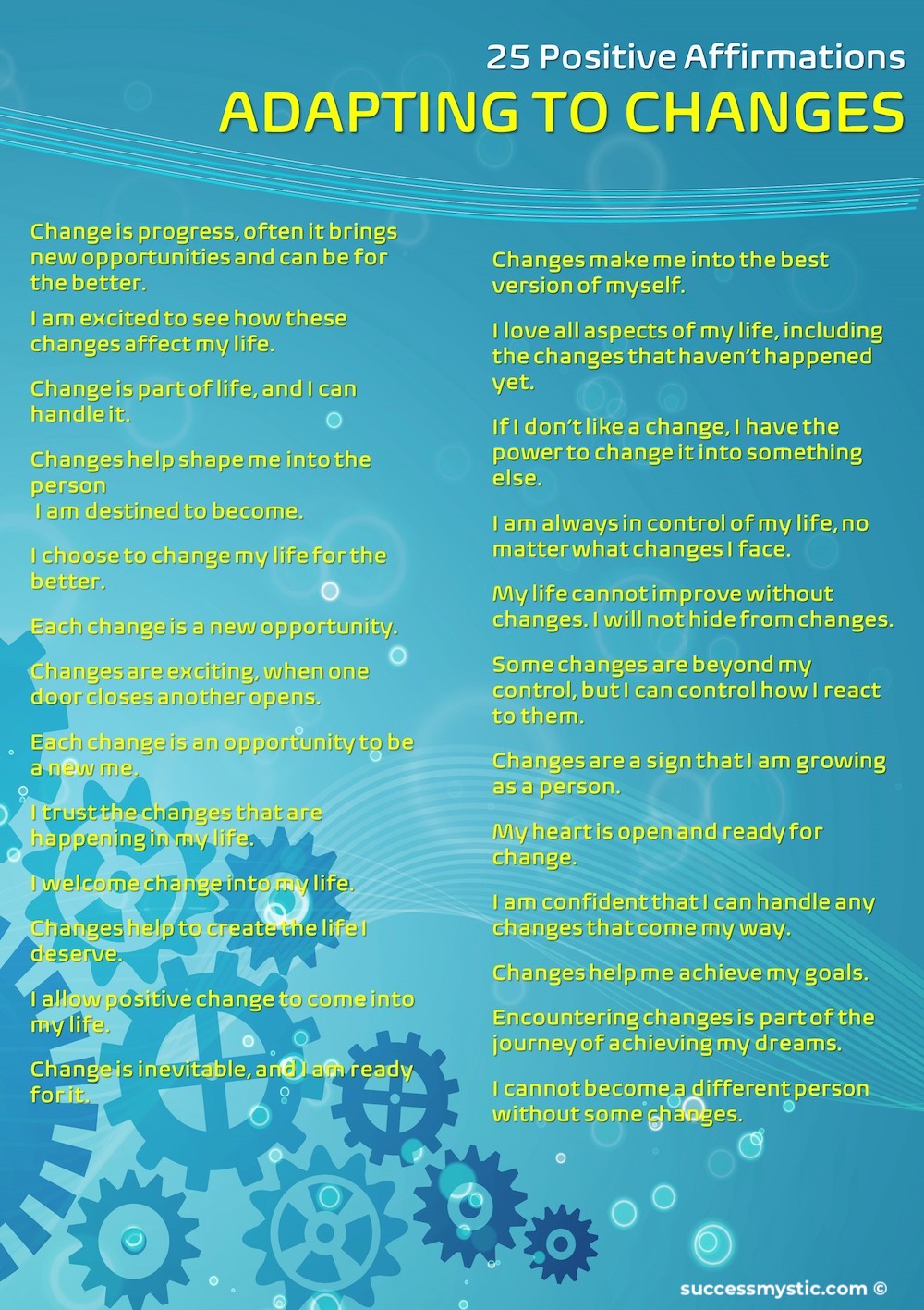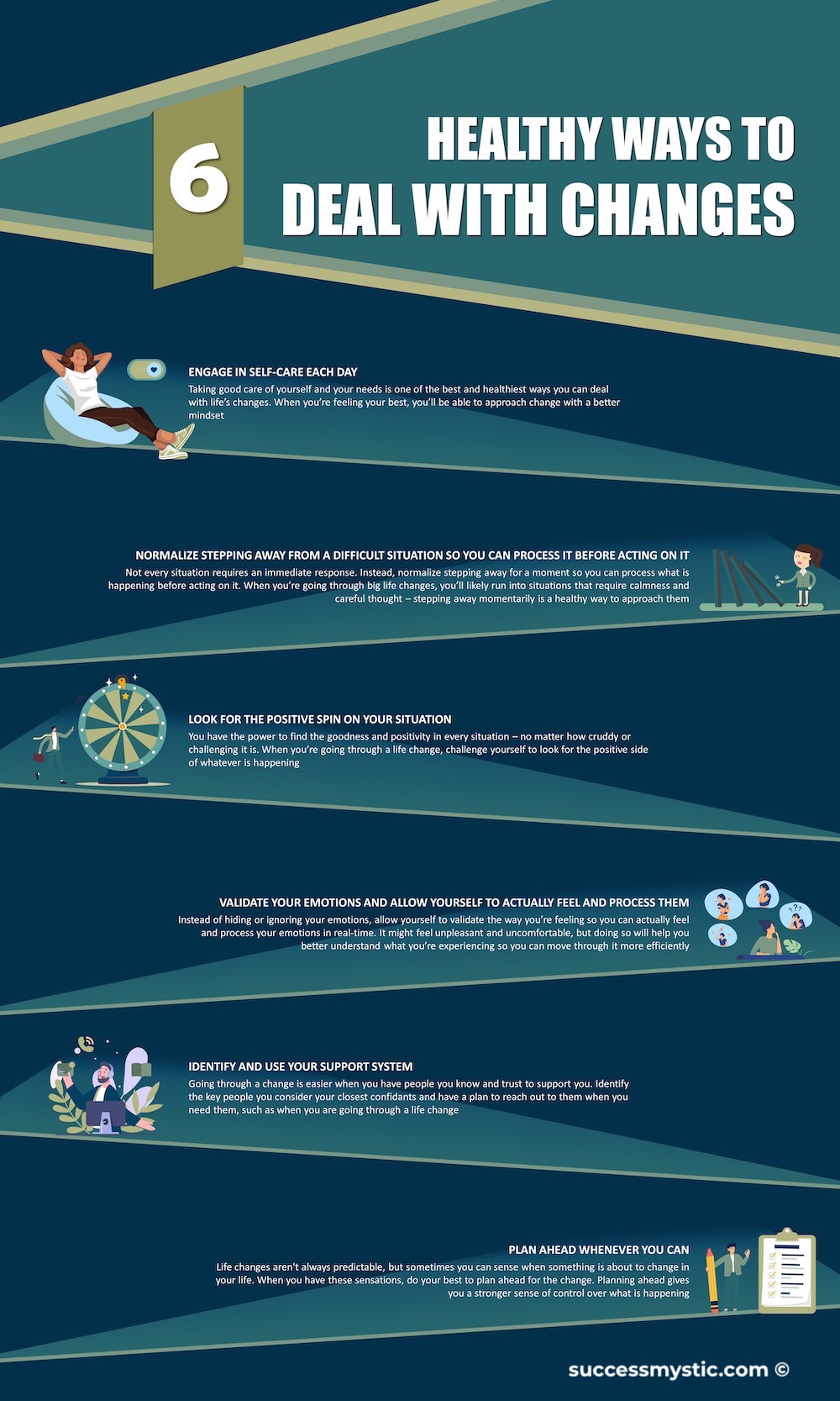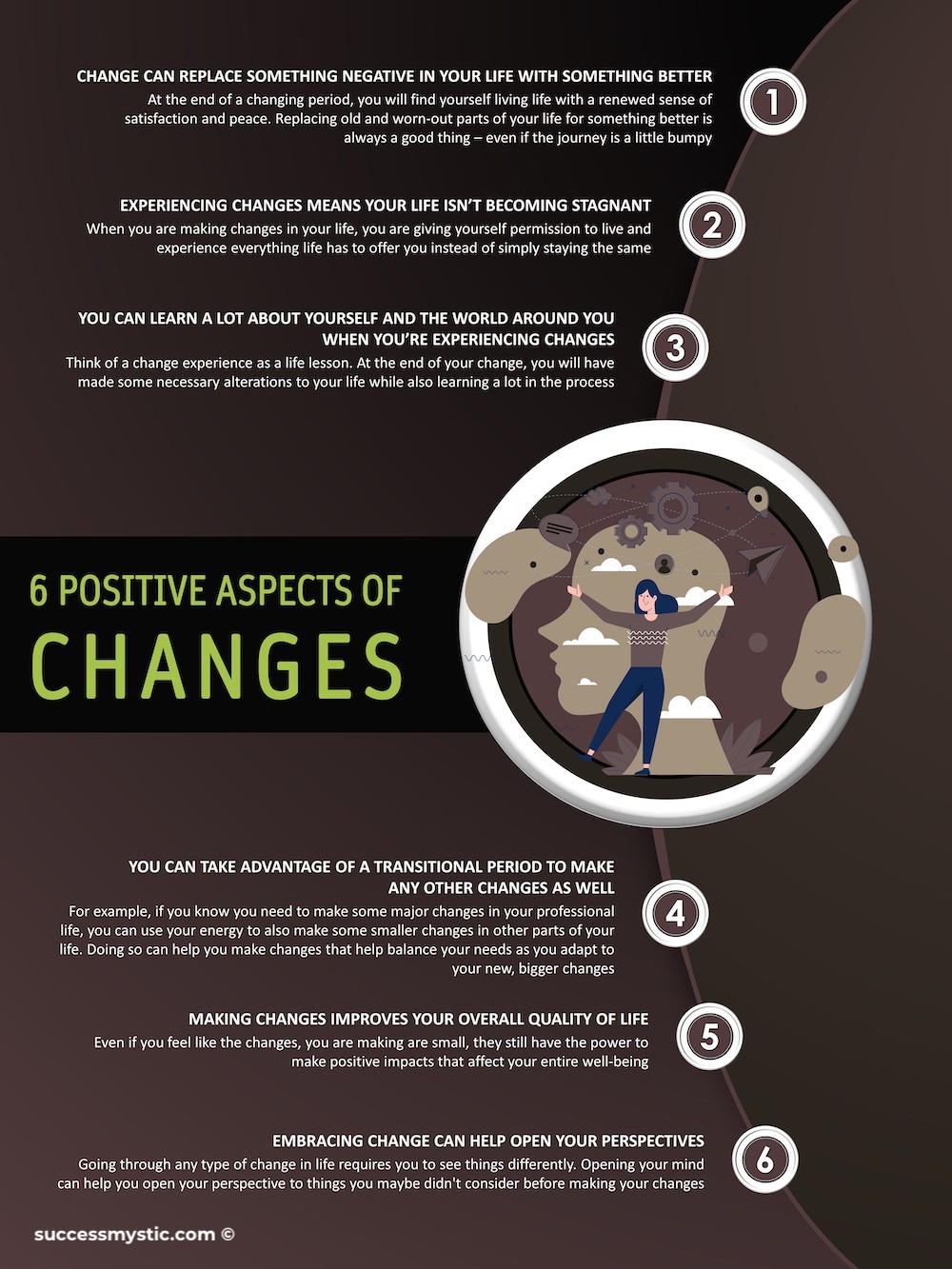It’s Time To Understand The Power of Adapting To Changes
successmystic.com
The world is constantly changing. Adapting to change can be a challenge—but it’s also an opportunity. Learning how to adapt quickly and effectively can help you to avoid unnecessary stress in fighting that which inevitably must change.
According to Vocabulary.com
- “The noun change can refer to any thing or state that is different from what it once was.”
According to Websters Dictionary,
- Verb: to make the form, nature, content, future course, etc., of (something) different from what it is or from what it would be if left alone: to change one’s name; to change one’s opinion.
- Verb: to become different; to become altered or modified.
These definitions sound pretty innocent. They are not really threatening or something to fear. Yet, many people do fear change. It seems to be a part of the human condition.
“We fear change because we can’t anticipate the outcome. Our fear of change is based on stories—both real and the imagined ones we tell ourselves. We narrate our lives as if they are out of our control—we feel as we are playing a part someone else wrote for us.”
Psychology today
There is also the “I don’t want anything different” obstacle that blocks our ability to adapt to changes we may not welcome.
The truth is many surprises that occur in life actually become gifts we never knew we wanted. A good of example of this is when people hold onto relationships that are not good for them or just not meant to work out. The thought and fear is, “I can’t live without this person.” When the relationships ends, we may feel like “life is over,” or “I will never be happy again.” Then sometime later we meet someone that truly makes us happy, and we laugh and think “thank god, that other relationship did not work out.
The only thing that is constant in life is change. No human has true control over life and the changes that may occur. The only thing we do have control over is how we react and in this idea we can find the most optimal ways of not only adapting to changes but to also write our own stories.
Why Embracing Change Is Important
The world around us is constantly changing, and if we do not keep up with those changes, we risk falling behind our competitors. In order to remain successful and stay ahead of the competition, it is important for us to embrace change.
10 Reasons To Embrace Change
- Change can be exciting. It really is about how we perceive it. In the words of Alexander Graham Bell, “when one door closes another opens,” it really is exciting to think about what might be on the other side.
- Change can present many new opportunities for growth and possibilities for success.
- Change is a teacher.
- Change teaches you to be flexible
- Change teaches you to be highly adaptable.
- Change is an opportunity for personal development and self-improvement.
- Change teaches you courage.
- Change teaches you resilience and grit.
- Change helps you be more proactive.
- Change makes life more interesting.
When Change Occurs
We all experience moments of change throughout our lives – sometimes these changes are sudden and unexpected, while other times they are gradual but still require adjustment on our part if we want them to be successful long-term changes. No matter what type of change you’re facing, being able to recognize it, process it, and then adjust accordingly is key if you want your transition period to be as seamless as possible.
Being able to understand the need for adaptability gives you the tools necessary for survival in any situation – whether it’s personal or business-related – because you know how best to handle yourself in uncertain times or unfamiliar environments.
And even if you don’t feel like you have what it takes right away, practicing adaptive behaviors until they become second nature will ensure that no matter what comes your way in life you will be prepared for whatever challenges may arise.
Being able to recognize the need for adaptability is crucial if you want success in any area of life – both personally and professionally. Adapting quickly allows us not only to survive but thrive during times of change or uncertainty; it gives us the tools necessary for navigating difficult conversations; and ultimately helps us become better problem solvers by understanding that there isn’t always one solution that fits all scenarios.
Sometimes we have to think outside the box! With these skills under your belt, the successful navigation of changes is sure to follow!
Understanding The Importance Of Adaptation: Why It Matters
Adaptation is a powerful tool for any living being, and it’s no different for us as humans. In today’s world, where everything changes at lightning speed, having the ability to adapt quickly and efficiently can be the difference between surviving and thriving. It’s important to understand why adaptation matters in order to stay afloat in this ever-changing landscape.
What Is Adaptation
Adaptation is the process of adjusting to new conditions or circumstances. As humans, we have always had to make quick adjustments in order to survive.
We can see this in our evolutionary history when humans adapted to changing climates and migrated from one area to another in an effort to find food and shelter. Today, adaptation still plays a vital role in our survival but also goes beyond simply existing; it helps us thrive.
Adapting to changes is a skill that can be learned and perfected. Evaluating why changes are necessary, having an open mind about potential solutions, and being flexible enough to adjust plans accordingly and adapt can lead to a better you and a better life.
Understanding The Need For Adaptability
In today’s fast-paced world, it’s important to be able to adapt quickly to changes and challenges. But why is adaptability so important? It goes beyond just being able to accept change – true adaptability requires the ability to recognize and respond effectively to any situation or challenge. In this blog post, we’ll look at why adaptability is essential for success in virtually every area of life.
Adapting to changes means being open minded about potential solutions. Don’t just think inside the box – explore different approaches and consider all possibilities before making a decision.
Adapting to change means being flexible enough to adjust your plans when needed. Be ready to pivot if a solution isn’t working out as planned or if something unexpected happens along the way. Being able to quickly assess a situation and adjust your plan accordingly will save time and resources while helping you achieve success more efficiently.
6 Benefits Of Adaptability
- Adaptability gives us the ability to take on changes and face them head-on.
- It helps us stay competitive in a rapidly changing environment, allowing us to respond quickly and effectively to whatever comes our way.
- Being flexible and adaptive can also help us find creative solutions that might otherwise go unnoticed.
- Moreover, being adaptable can help us navigate difficult conversations more easily. We can better assess the needs of others, as well as our own emotions and motivations, which will allow us to come up with solutions that benefit everyone involved.
- Being able to pivot quickly also makes for smoother transitions when it comes time for change – whether it’s taking on a new role at work or adapting your lifestyle due to a new pandemic restriction.
- Finally, having an adaptive mindset helps us approach problems from different angles. We can take into account multiple perspectives when making decisions and learn from mistakes without feeling discouraged or overwhelmed. This ensures that we remain open-minded and are never stagnant in our learning process.
Key Reasons Adaptation Matters
As humans, we must constantly adapt in order to stay competitive. This applies not only to our professional lives but also to our personal lives as well. We must continually learn new skills, develop strategies for succeeding at work, build relationships with others, and stay up to date on trends that are relevant to us.
By understanding the importance of adaptation, we can begin taking steps toward becoming more resilient and successful individuals who are better equipped for whatever life throws at them.
Adaptability Is Key For Effectively Dealing With Change
Adaptability is an essential skill for success because it allows us to quickly adjust when faced with difficult situations or obstacles that may arise during our journey toward achieving goals. With adaptability comes flexibility—the ability to adjust your approach based on external factors such as feedback from colleagues or customers—which can help you overcome any roadblocks that come your way without compromising your end goal.
Additionally, adapting quickly allows you to seize opportunities before they pass you by; if you’re able to pivot quickly and effectively when needed, chances are you’ll be able to reach your goals faster than someone who cannot do so easily or readily.
All in all, understanding why adaptation matters is key if we want success both professionally and personally. By recognizing its importance early on, we can start developing an adaptable mindset that will serve us throughout our lives—whether it’s learning how best to cope with change or seizing opportunities before they pass us by.
When it comes down it all boils down to one simple phrase: “Adapt or die.”
If we want success then we must be able to embrace change and view it as an opportunity rather than a challenge!
The Process Of Adaptation: How To Adapt To Changes
We live in a world of ever-changing circumstances. It can be hard to keep up with the waves of change that come our way, but it is necessary for our own growth and development.
Learning how to adapt and embrace change is an important process that can be made easier with the right tools and resources. Let’s break down the process of adaptation and explore how you can use it to your advantage.
Acknowledge The Change
Whether change is known to be coming or has already occurred the first step is always to acknowledge that change and accept its existence. Without this step it is easy to become complacent, fall into denial and do nothing proactive to deal with or address the change. Non-action can result in high levels of unnecessary stress and the lack of preparation and steps to ensure the change is dealt with effectively for the best end result.
Evaluate Your Feelings About Change
When faced with change, take some time to evaluate your feelings towards it. How do you feel when confronted with something unexpected? Do you panic or freeze? Or do you take a deep breath and prepare yourself for the task ahead?
When evaluating your feelings, be aware of any negative self-talk that might pop up. Negative self-talk can often lead us into believing we are not capable of handling change successfully, so it’s important to recognize this thought pattern and learn how to address it if it arises.
Develop An Action Plan
Once you have evaluated your feelings about change, start developing an action plan for adapting to it. An action plan does not need to be overly complicated; instead, focus on taking small steps toward a larger goal. Begin by setting realistic goals that are achievable within a given timeline; then break those goals down into smaller tasks that will help you move closer to achieving them.
For example, if your goal is to start a business, break this goal down into smaller tasks such as researching business ideas, creating a budget, or finding potential investors. By breaking things down into manageable chunks, you can better prepare yourself for adapting in the long run.
Stay Positive
Finally, stay positive! Change can often bring about fear and anxiety; however, by focusing on the positive aspects of change and what it could bring our way – such as new opportunities or experiences – we can better prepare ourselves for the future ahead.
Additionally, don’t be afraid to ask for support from family and friends during times of transition – they may offer valuable insight or advice that could help you move forward more confidently!
Adapting to changes in life is no easy feat; however, it is an essential skill if we want to grow both personally and professionally. Take some time to evaluate your feelings about change before developing an action plan for adapting successfully.
Finally, remember to stay positive throughout all stages of adaptation – even if things don’t always go according to plan!
Embracing Change – 6 Positive Aspects Of Changes
One of the best ways to become better at adapting to changes is to embrace it instead of fighting it. The truth is change is inevitable. Nothing in life is really sure but change. Once you adopt this way of thinking and really accept it as reality you can become proactive towards changes in your life by understanding and focusing on its positive aspects.
If you find yourself facing changes in life and the prospect of going through them terrifies you, a great way to cope is to focus on the positive aspects of making change. Even though changing parts of your life can be intimidating, there are important positive aspects that make life changes something to embrace.
When perception of change changes to something positive, adapting becomes that much easier and more successful.
If you are struggling to accept changes happening in your life, consider these six positive aspects of change to help you find peace in embracing the new and unfamiliar.
Aspect 1: Change can replace something negative in your life with something better.
“When one door closes another door opens.” – Alexander Graham Bell
Anytime you are making a change in your life, you are likely doing it because you need to remove something negative in your life by replacing it with something better. Even though going through change can feel uncomfortable and uncertain, the end results are always worth experiencing those emotions.
At the end of a changing period, you will find yourself living life with a renewed sense of satisfaction and peace. Replacing old and worn out parts of your life for something better is always a good thing – even if the journey is a little bumpy.
Aspect 2: Experiencing changes means your life isn’t becoming stagnant.
Going through a number of changes throughout your life is completely normal. People are meant to grow, develop, and change over time. This is because people constantly learn new skills, desire new things, and develop new goals for themselves.
When you are going through changes, it’s important to remember that it means you are not living a stagnant life. When you are making changes in your life, you are giving yourself permission to live and experience everything life has to offer you instead of simply staying the same.
Aspect 3: You can learn a lot about yourself and the world around you when you’re experiencing changes.
Experiencing big changes in life can teach you a lot about yourself and the world around you. Going through change is not always going to be comfortable or easy, but going through these types of experiences can help you develop your character and learn more about how the world operates.
Think of a change experience as a life lesson. At the end of your change, you will have made some necessary alterations to your life while also learning a lot in the process.
Aspect 4: You can take advantage of a transitional period to make any other changes as well.
If you are already going through a change in your life, you can take advantage of this transitional period to make some other necessary changes as well. For example, if you know you need to make some major changes in your professional life, you can use your energy to also make some smaller changes in other parts of your life. Doing so can help you make changes that help balance your needs as you adapt to your new, bigger changes.
Aspect 5: Making changes improves your overall quality of life.
Any time you make the effort to make a change in your life, you are also making an effort to improve your overall quality of life. Even if you feel like the changes you are making are small, they still have the power to make positive impacts that affect your entire well-being.
Aspect 6: Embracing change can help open your perspectives.
Going through any type of change in life requires you to see things differently. By making a change, you are eschewing old patterns and habits for something new and more beneficial for you.
When you break away from these old patterns and habits, it can open your mind to see and understand things differently. Opening your mind can help you open your perspective to things you maybe didn’t consider before making your changes.
Embracing Change For Growth And Success
Change is often seen as something to be feared, but it can also bring about great opportunities. It can be difficult to transition from the familiar to the unknown, but when done correctly, embracing change can lead you to better places and opportunities than before.
Acknowledge Your Fear Of Change
The first step to embracing change is acknowledging your fear of it. Admitting that you are afraid of change may feel uncomfortable at first, but it is an important part of the process.
Once you recognize why you are afraid of change, you can begin to work through those fears and find ways to move forward. It’s okay to be scared – that’s natural – but don’t let that stop you from trying something new or making changes in your life.
Break Down Big Changes Into Smaller Steps
Trying to make drastic changes all at once can be overwhelming and difficult to maintain. To make things easier for yourself, break down any big changes into smaller steps or tasks that are more manageable.
For example, if your goal is to exercise more often, focus on just one small step at a time such as going for a short walk each day or doing some simple stretches before bed each night. Breaking down large goals into smaller steps will help you stay on track and make the process less intimidating.
Be Open-Minded
Change requires being open-minded and accepting that things might not turn out exactly as expected when going in a new direction or trying something different than what you’re used to.
Be willing to take risks and try something new even if it doesn’t guarantee success right away. You never know where these explorations will take you until you actually take them! By being open-minded about potential outcomes, opportunities can arise that would have otherwise been missed due to fear or hesitation around the unknowns of change.
The Relationship Between Adaptation And Personal Growth
As the world around us evolves, so too must we. Whether it’s adapting to new technology or a new job, life is full of changes that require us to adjust our behavior in order to stay relevant. But how can adaptation help us in our personal growth? Let’s take a closer look.
Adaptation is the ability to adjust one’s behavior or attitude in order to be successful in a given environment. It can also refer to how an organism adjusts its biology and physiology in order to survive in a changing environment. In both cases, adaptation requires one to have the capacity for change, as well as the willingness to learn new skills and knowledge when needed.
1| The Benefits Of Adapting For Personal Growth
Adaptability leads to greater personal growth in a variety of ways. Firstly, when we adapt to new situations or environments, we become more confident in our abilities to handle change. This increased confidence allows us to take on more challenging tasks with a positive outlook.
Additionally, adapting means learning new skills and knowledge that can be applied across different scenarios. For example, if you have experience adapting in one job role or industry, you will likely find it easier to do so in another role or industry since you have already acquired the necessary skill sets.
Furthermore, adaptation forces us out of our comfort zone which can lead to significant personal growth opportunities. By taking risks and trying something new—whether it’s a new job or hobby—we open ourselves up for potential rewards such as career advancement or simply finding joy in doing something outside our normal routine. Being able to stay flexible also means being able to view opportunities from multiple angles instead of getting stuck on one idea or path.
2| How Adaptability Improves Personal Growth
Adaptability is essential for personal growth because it encourages you to be open-minded and willing to learn new things. Through adapting your behavior or attitude, you can gain insight into different perspectives which will allow you to develop deeper understanding about yourself as well as other people’s experiences. And by constantly adapting, you will be able to expand your knowledge base and build upon existing skills which will make you more capable of tackling any task that comes your way.
3| Our Lives Are A Never-Ending Cycle Of Adaptation And Growth
Life is a dynamic phenomenon that is constantly changing, challenging, and shaping us. We humans have remarkable abilities to take life’s never-ending cycle of adaptation and growth and use it to our advantage. Instead of simply accepting what comes our way, we have the capacity to actively engage in self-improvement.
This can come in the form of professional development, strengthening personal relationships with family and friends, or exploring self-development through daily personal reflection and meditation. Whether it’s physical changes such as gaining more muscle mass or mental transformations like deepening our understanding of something, life will never fail to ask us to grow in one way or another; the possibilities are truly limitless.
4| We Must Be Adaptable To Survive In An Ever-Changing World
Our world is an ever-evolving landscape, and to keep up, we must learn to adapt. Change can manifest in many forms – technological advances, medical breakthroughs, or even geopolitical transformations – and all of these necessitate people’s capacity for resilience. We must be agile enough to take on new challenges and brave enough to navigate the unknown.
By cultivating flexibility and openness in our attitudes, beliefs, or behaviors, we can work together as a society toward progress. To survive in today’s world means having the willingness to accept change without fear or hesitation. Let us embrace this spirit of adaptability so that we may move forward with poise and confidence toward a better future for all of us.
It’s clear that adaptability plays an important role in personal growth. By learning how to adapt quickly and effectively, we are able to become more resilient individuals who are better equipped with the skills needed for success in any situation.
Adapting also allows us to expand our knowledge base by gaining insights into different perspectives which can lead us down paths we had never imagined before! So, if you’re looking for ways to improve yourself on a personal level, start by focusing on developing your adaptive skillset!
5| Adapting To Personal Challenges
On a personal level, adapting to changes can help us cope with difficult situations and become more resilient individuals over time. When life throws us curve balls—whether it’s job loss, illness, or a challenging relationship—we must learn how to accept these changes instead of resisting them. By doing so, we become more equipped to handle future challenges that may arise since we have already developed the skills necessary for change adaptation (e.g., problem solving skills).
Furthermore, when we are able to accept change without resistance, we open ourselves up for new opportunities that may come our way—opportunities that we wouldn’t have seen had we been too caught up in trying not to let go of what was once familiar or comfortable for us before the change happened!
The power of adapting lies within all of us; it just takes practice and dedication to fully unlock its potential. With commitment comes strength—the strength needed not only to survive but thrive during times when things seem uncertain or unfamiliar!
Don’t be afraid; take risks and try something different today! You might surprise yourself with how much you can accomplish when you decide not to fear change but embrace it instead!
The Science Of Adaptation: How The Brain And Body Respond To Change
Change is an inevitable part of life. Whether it’s a new job, a move to another city, or even just the addition of a new family member, change can be both exciting and overwhelming. But how do our brains and bodies respond when faced with change? Let’s take a look at the science behind adaptation.
1| Neuroplasticity
Neuroplasticity is the term used to describe the brain’s ability to change in response to experience. According to the University of Utah School of Health, It is through neuroplasticity that our brains are able to adapt to new situations, learn new skills, and gain knowledge from our environment.
This process happens on both a conscious and unconscious level as our brains create neural pathways that help us make sense of unfamiliar situations. Neuroplasticity allows us to experience positive changes in behavior and thought processes over time as we adapt to our environment.
2| Cortisol
Cortisol is a hormone produced by the adrenal glands that help regulate many functions in the body including stress levels. According to the University of Central Florida School of Health, when we are faced with an unfamiliar situation or sudden change, our cortisol levels increase in order for us to better cope with what has happened.
In other words, cortisol helps us prepare for any challenges that may come up during times of change or transition by increasing alertness and focus while simultaneously lowering anxiety levels.
3| The Stress Response System
The Stress Response System (SRS) is a biological system responsible for regulating how we respond emotionally and physically when faced with stressful situations. This system includes both physiological responses such as increased heart rate and respiration rate as well as psychological responses such as fear or anxiety. The SRS helps us adjust quickly in times of stress by activating certain reflexes like fight-or-flight mode so that we can react quickly without having to think too much about it first.
Adapting to change can be difficult but understanding how our brains and bodies respond can help make things easier!
Neuroplasticity allows us to form new neural pathways which help us learn new skills, gain knowledge from our environment, and build resilience when faced with difficult challenges.
Cortisol helps regulate stress levels while the Stress Response System helps us react quickly when dealing with sudden changes in our lives. By understanding these processes, we can better prepare ourselves for any changes that come our way!
Identifying And Overcoming Resistance To Change
When faced with a challenge that requires us to change our behavior, it is not uncommon for us to experience resistance. We might find ourselves making excuses or giving up altogether. This can be due to our fear of the unknown and being uncomfortable with something new. It is important to recognize and address this resistance in order to make positive changes in our lives. Let’s take a look at how we can identify and overcome resistance to change within ourselves.
1| Identifying Resistance
The first step in overcoming resistance is identifying it. We need to ask ourselves why we are feeling hesitant or scared about a certain situation or task.
Is it because of feelings of insecurity or lack of confidence? Or do we feel like we do not have the necessary skills or resources?
Once we understand why we are feeling resistant, then we can start addressing the problem head-on.
2| Overcoming Fear
Once we have identified our fear, the next step is finding ways to move past it and push through any obstacles that may be standing in our way. One way is by taking small steps towards our goal—this will give us a sense of accomplishment and help build our confidence as well as motivate us further.
It is also important to remind ourselves that failure should not be seen as an option; instead, try seeing failure as an opportunity for growth and learning. Taking risks and facing challenges can help us strengthen our resilience, so don’t be afraid of trying something new!
3| Take Time To Reflect
Finally, when going through any kind of major transition, it’s important that you take time for yourself and reflect on all the progress you’ve made so far. This will help you stay focused on your goals and give you a sense of satisfaction for all your hard work! Celebrate your successes along the way—this will keep you motivated till the end!
Identifying and overcoming resistance to change within ourselves can be difficult but with dedication and focus, anything can be achieved!
By recognizing our fears, taking small steps towards reaching our goals, taking risks, reflecting on our progress, and celebrating every success along the way—we can learn how to become more resilient in face of any obstacle life throws at us! So don’t hesitate—take control today! Start identifying your fears today so you can begin overcoming them tomorrow!
Building Resilience: Strategies For Adapting To Adversity
It’s hard to face adversity. Whether it’s a global pandemic, a natural disaster, or something else entirely, when bad things happen, it can be tough to keep going. That’s why it’s so important to have resilience—the ability to adapt and bounce back in the face of adversity. Fortunately, there are things you can do to build resilience and become better equipped to handle whatever life throws your way.
1| Identify Your Emotional triggers
The first step to building resilience is understanding what sets you off emotionally. When you know what your triggers are, you can be proactive about managing them. For example, let’s say you’re someone who gets overwhelmed easily. In that case, it would be helpful for you to identify situations that tend to overwhelm you so that you can avoid them or be better prepared to deal with them.
2| Seek Out Supportive Relationships
It’s important to have supportive relationships in your life—people you can rely on when times are tough. These could be friends, family members, colleagues, or anyone else who makes you feel safe and loved. Lean on these people when times are tough and know that you don’t have to go through difficult times alone.
3| Develop A Positive Mindset
Your mindset plays a big role in how well you’re able to cope with adversity. If you have a positive outlook, you’ll be more likely to see challenges as opportunities and view setbacks as temporary roadblocks on the way to success.
On the other hand, if you have a negative mindset, you’ll be more likely to see challenges as insurmountable obstacles and view setbacks as permanent failures. Work on developing a positive mindset—it will serve you well in times of adversity.
4| Practice Self-care
Last but not least, don’t forget to practice self-care! When times are tough, it’s easy to neglect your own needs as you focus on taking care of others or dealing with the problem at hand. But it’s important to remember that self-care is not selfish—it’s essential for maintaining your mental and emotional health so that you can be there for others when they need you.
Make sure to schedule some time for yourself every day, even if it’s just 10 minutes so that you can recharge your batteries and keep going.
No one is immune from adversity—life happens! But if you want to increase your chances of bouncing back quickly after tough times hit, then these five strategies can help!
By identifying your emotional triggers, seeking out supportive relationships, developing a positive mindset, being flexible and open-minded, and practicing self-care, you can build the resilience you need to weather any storm life throws your way!
Embracing Change: The Role Of Mindset And Attitude
Change can be difficult, but it’s also essential for growth. Having the right mindset and attitude when dealing with change is key to thriving through it rather than just surviving. Whether you’re dealing with work-related, personal, or social changes, embracing change with a positive outlook and mentality is a surefire way to succeed. Let’s dive into how you can develop the right mindset and attitude when it comes to adapting to change.
1| Be Open-Minded And Flexible
The first step towards thriving through change is being open-minded and flexible. Having an open mind means that you are willing to consider new ideas and ways of doing things without judging them too quickly.
Being flexible means that you are able to adjust your plans and actions in order to accommodate new circumstances or challenges that arise. This approach will allow you to embrace changes more easily and make adjustments as needed in order to keep moving forward positively while still staying true to yourself and your values.
2| Focus On Opportunities Instead Of Obstacles
When faced with a sudden or unexpected change, it’s easy for us to become overwhelmed by all the obstacles we encounter along the way. However, instead of focusing on obstacles, try looking for opportunities within the change itself.
Focusing on opportunities will help shift your perspective from one of fear or trepidation towards one of positivity and optimism. This kind of mindset encourages creativity which can lead to innovative solutions that wouldn’t have been possible before!
3| Take Action And Persevere
Finally, developing a resilient attitude when confronted with change is key in order to successfully move through it instead of getting stuck in fear or worry about potential negative outcomes. Taking action can give you a sense of control over the situation which will help boost your confidence so that you can persevere even in challenging times. Your attitude will determine how well you handle difficult situations so focus on maintaining a positive outlook no matter what comes your way!
Change is inevitable—whether we like it or not, there will always be something new around the corner waiting for us! To make sure we thrive rather than just survive during these times, embracing change with an open mindset and positive attitude is key.
Focus on opportunities instead of obstacles, take action when necessary, and persevere even in difficult times—doing so will ensure that you come out stronger after each challenge! With these tips in mind, how are you going to take on your next big transition?
Navigating Organizational Change: Strategies for Leaders and Teams
Change is an inevitable part of organizational life. Whether it’s a change in leadership, an adjustment to the company’s strategy, or a shift in the work environment, navigating organizational change can be difficult for leaders, teams, and individuals alike.
If not managed correctly, change can cause disruption and reduce morale. But when managed well, it can lead to greater efficiency, productivity, and engagement within the organization.
Leadership Support
The first and most important step in navigating organizational change is ensuring that there is strong leadership support from the top down. Leaders need to be actively involved in implementing the changes and communicating them effectively to their teams so that everyone understands why the changes are happening and what impact they will have on the organization as a whole.
Leaders should also provide clear guidance on how the changes should be implemented so that everyone is working towards the same goals. Finally, they should create an environment of trust and openness where team members feel comfortable voicing their opinions and concerns without fear of retribution.
Team Engagement
The second step is engaging all team members in the process of navigating organizational change. This means ensuring that all stakeholders—including management, employees, customers, suppliers—are involved in discussions about how best to implement the changes so that everyone has a chance to contribute ideas and provide input into decisions being made at all levels of the organization. It also means providing regular updates on progress so that team members feel informed about what is happening throughout the process of change management.
Effective Communication
Finally, effective communication plays an essential role in successful organizational change management. Leaders must ensure that messages about new initiatives or procedures are communicated clearly and consistently across all levels of the organization so that everyone has a shared understanding of what is expected from them during times of transition or upheaval.
They should also provide multiple ways for team members to stay connected during these periods—such as virtual meetings or online forums—so that any questions or concerns can be addressed quickly and efficiently.
Navigating organizational change can be daunting but it doesn’t have to be overwhelming if leaders take proactive steps to ensure their teams are supported throughout every stage of transition.
By providing leadership support, engaging all stakeholders through open dialogue and collaboration, and using effective communication strategies—leaders can ensure their teams are better equipped to handle any disruptions caused by organizational changes with minimal disruption or loss of morale. With these strategies in place, leaders can successfully navigate any period of transition while still maintaining a high level of productivity within their organizations.
Personal Growth Through Adaptation: Embracing New Opportunities
Maintaining a positive outlook through everyday life can be difficult, but understanding the adaptability of personal growth can help make it easier. Adapting your lifestyle to new opportunities and taking calculated risks are key elements of embracing change. You should also reflect on past experiences or current circumstances and seek advice from others in order to make an informed decision.
Ultimately, learning how to adjust when faced with adversity breeds resilience and builds strength that you can rely upon in any given situation. Taking advantage of the changes around you and seeking out new experiences may help propel your journey toward self-discovery and personal growth.
1| Identifying New Opportunities For Growth
Identifying new opportunities for personal growth can be a rewarding and enlightening experience. In addition to making positive changes in our lives, exploring different outlets of self-improvement is an important step toward developing a stronger sense of self-awareness and direction. It can be beneficial to think beyond the traditional avenues of personal growth, such as education and career development.
Finding activities that challenge us to learn more about ourselves outside of our comfort zones can help us break through any mental boundaries we have set for ourselves. From exciting hobbies to unique travel experiences, there are many possibilities that can further broaden our perspectives and offer us valuable insights into who we truly are and who we want to become.
2| Strategies For Successfully Navigating New Experiences
Navigating a new experience can be daunting, but there are some helpful tips to keep in mind that can help make the journey smoother. First and foremost, being well-prepared is essential. Be sure to do your research prior to jumping into a new experience so that you have an idea of what challenges or opportunities may arise.
Additionally, having a plan for tackling any unexpected hiccups can go a long way in helping to proactively problem-solve should something go wrong. Lastly, don’t be afraid to ask for help when needed!
Seeking guidance from someone familiar with the experience can provide valuable insight and ensure that you are equipped with the best possible advice throughout this process. Following these strategies will help ensure you get the most out of every new experience!
3| Measuring And Tracking Progress And Success
Measuring and tracking progress and success should be a priority as we move into new opportunities. It’s easy to become overwhelmed and lose sight of the original goal if we don’t know how far we’ve come since starting this journey. That’s why it’s important to break down our goals into smaller, achievable steps. Measuring our progress against these objectives will enable us to accurately assess our current standing and allow us to refine our strategies accordingly.
This can be done through tracking tools such as timelines, budgets, project management platforms and more. Successful tracking can provide us with valuable insight into future ambitions allowing us an effective way of making adjustments where needed. With the right strategy in place, we can benefit from the full range of possibilities that come with embracing new opportunities.
4| Continuously Seeking Out New Opportunities For Growth And Development
Embracing personal growth and development is an important part of life, and those who strive for betterment in all areas of their lives understand that continuously seeking out new opportunities to do so can bring about meaningful changes.
Being open to exploring different avenues for growth can open doors to experiences we never knew were possible and spur us to take steps that we would not have considered before.
Taking careful inventory of our skill sets and considering how they could be advanced through extra efforts is a great place to start. With each chance taken, the potential rewards can be profound: from improved job prospects, higher income, or greater satisfaction in life. No matter the individual’s goals or ambitions, chasing after new learning opportunities keeps the journey of self-improvement ongoing.
Adapt To Changes: 20 Tips For Success
Adapting to change can be challenging as it often means leaving our comfort zone and adapting to a new reality. But when we embrace the opportunities venturing into the unknown brings, good things can happen! To help you do that, here are 20 tips for adapting to changes successfully. Even small steps taken consistently can lead to major life transformations and improvements. Start reflecting on your current situation today and make your changes count!
1| Stay Informed And Educated About The Changes You Are Facing
Adapting successfully to changes can be an overwhelming process, but it is possible with knowledge and preparation. Staying informed and educated about the changes you are facing is essential for this. Keeping up to date on the current events in your environment, along with updates from trusted sources, can help you to establish a clear picture of the changes ahead.
Doing your own research into recent developments and understanding how they might impact your life is also key to being successful in adapting – by having a wealth of knowledge at your fingertips, you’ll feel much more prepared for any sudden shifts or surprises that come your way.
2| Keep An Open Mind And Be Willing To Consider New Perspectives
Get excited about change! It is natural to feel apprehensive when faced with change, but keeping an open mind can help in successfully adapting. Look at changes as new opportunities; try to stay positive and take the initiative to learn new skills or concepts that might come with changes.
Having a flexible mindset helps when it comes to being open to different perspectives; understanding key points from different points of view can ultimately increase one’s perspective and knowledge.
It is also important to remember that having a grip on the situation does not always mean keeping things the same; sometimes, adaptation requires taking risks and making bold decisions – it could be beneficial to step out of your comfort zone from time to time. Ultimately, having a resilience that allows for shifts in environment and thinking will contribute largely towards adapting successfully.
3| Set Clear Goals And Develop A Plan To Achieve Them
When faced with changes, setting clear goals, and formulating a plan to achieve them can be an effective way of successfully adapting. When you have a goal-oriented mindset, it’s easier to make decisions and take action steps that are in line with the direction you’re aiming for. Create daily or weekly markers as representations of progress towards your goals, so that you’re able to measure each step closer that you take.
Remember that consistency is key in order to effectively get there — even if the progress is slow and steady. Of course, don’t forget to incorporate changes in your environment into this plan as well; keeping track of evolving trends helps ensure success.
4| Focus On What You Can Control And Let Go Of What You Cannot
We are constantly faced with changing situations in life, and it is important to understand how to effectively cope with them. One of the most essential tips for successfully adapting to changes is to focus on what you can control and let go of what you cannot. This can help us to stay grounded even when life throws us a curveball.
Cultivating an attitude of acceptance regarding unexpected changes can also be helpful, as this allows us the space necessary for creating new solutions we may have never thought of before.
It’s all about staying connected to our core values and finding creative ways to move forward, no matter how intimidating or challenging the situation may seem. With the right approach, we can become more resilient when facing times of change, allowing us to make progress without taking too heavy a toll on our emotional well-being.
5| Build A Strong Support Network Of Friends And Family
One of the best tips for successfully adapting to big changes in life is to build a strong support network of friends and family. Having a strong, reliable support system can make going through difficult, stressful changes easier and more manageable. When you have someone you trust who can share your worries or offer a helping hand when you don’t know where to turn, all types of new opportunities become possible.
Get to know others in your community and reach out as much as possible; you never know which relationships may end up growing into supportive and meaningful friendships that can last for many years. Make sure your family is also part of your support network; don’t forget the people who love you and have been with you from the start.
6| Maintain A Positive Attitude And Stay Optimistic
No matter what life throws at you, maintaining a positive attitude and staying optimistic is a surefire way to successfully adapt to changes. Positive thinking doesn’t just improve your outlook on life – it’ll also help you stay motivated, productive, and resilient. When setbacks seem inevitable, frame those events as learning opportunities and remember that the end result of the situation is always within your control.
With an optimistic approach and an open mindset, you can have the power to create a successful outcome in any change you face. The simple act of consciously deciding to keep a positive attitude and stay objective while adapting can make all the difference in the world.
7| Learn From Past Experiences And Use Them To Inform Your Decision Making
Adapting to changes calls for careful thought and knowledge of how previous transitions have gone. Learning from past experiences can be key in successfully navigating new change. Therefore, it’s important to understand the lessons learned along the way when dealing with unforeseen circumstances.
Looking back on past experiences will enable you to identify patterns and teachable moments that can help inform your decision-making. As well as being aware of what occurred in the past, understanding why things happened can really add further insight when facing a new challenge. With this approach, adapting to changes can be easier as there is a better understanding of how both successes and mistakes have been handled in the past.
8| Take Calculated Risks And Be Willing To Try New Things
With the rapidly changing world, successfully adapting to new changes can be a challenge. One reliable way to make the process easier involves taking calculated risks and trying out different things. Being willing to take a chance with new ideas or activities allows you to get outside of your comfort zone, which is crucial for personal growth and making progress in any field or area.
Additionally, it is important to remember that all risks are not equal; when evaluating, pay attention to what could lie ahead and consider how much you stand to gain from any given choice before deciding whether a change is worthwhile. Ultimately, being willing to take calculated risks and trying new experiences can help you more easily adapt to changes down the road.
9| Stay Organized And Prioritize Your Tasks And Responsibilities
Adapting to changes can be a difficult process, but luckily there are certain strategies that can help make it easier. A great way to start successfully adapting is to stay organized and prioritize your tasks and responsibilities. This means being mindful of the goals you have set for yourself and creating schedules that allow you to meet them on or ahead of time. Keeping organized will also help reduce stress and overwhelm since you won’t need to worry about forgotten assignments or deadlines.
Furthermore, when organizing your tasks around change, seek out small wins that make the journey easier. It could be as simple as making a to-do list and then checking off each item as you complete it. No matter what strategy works best for you, staying organized and prioritizing whenever possible is key in successfully adapting to change.
10| Communicate Effectively And Clearly With Others
Adapting to changes can be difficult, but having effective communication with those around you can make the transition smoother. It’s important to ensure all parties involved are on the same page and understand the message being conveyed.
Start by setting expectations of what will change and why. Individuals should be willing to lend an attentive ear and ask thoughtful questions when unclear about any part of the message in order for everyone to move forward together.
Additionally, maintaining consistent communication is key—check in regularly with people, remain open-minded throughout the process, and provide a platform where feedback can be discussed without judgment. Clear communication is essential when adapting to changes as it sets a foundation for understanding and encourages collaboration between everyone involved.
11| Learn To Manage Stress And Take Care Of Your Mental And Physical Health
Making a successful transition during moments of change requires balancing the stresses that accompany any form of growth. While it’s normal to feel anxious and uncertain, it is important to address these feelings in a healthy way. By managing stress with relaxation techniques such as yoga and meditation, we can incorporate mindfulness into our lives and be more present when tackling difficult tasks or situations.
Additionally, caring for our mental health through seeking help if needed, having conversations with supportive friends or family members, and exploring self-care activities are key components in providing emotional balance. A balanced mind will be better prepared to calmly face any changes that come along, as well as help us remember to take time off from working too hard if needed.
Along with proper mental care, physical health must be taken into account too. Exercise can help create countless benefits like improved sleep and increased energy to allow us to tackle whatever changes appear on our paths. Taking care of ourselves can prove useful in proactively preparing for and enduring adaptations that come with uncertainty.
12| Stay Adaptable And Be Willing To Adjust Your Plans As Needed
In order to stay successful in a world of changing circumstances, it is essential to cultivate adaptability and flexibility. Keeping our plans open-ended can give us the agility needed to adjust as situations arise, preventing us from getting stuck in set ways of doing things.
It is important to recognize that we need to make adjustments during times of fluctuation, rather than continuing with outdated protocols and traditional methods which may no longer be applicable. This helps us ensure that we remain able to navigate ever-changing environments with greater ease, propelling us toward success despite any challenges posed.
13| Stay Flexible And Be Willing To Change Your Approach
Adapting to change can be difficult, especially if it is sudden or unexpected. One of the best tips for successfully adapting to changes is to stay flexible and be willing to alter your approach. A flexible attitude allows you to remain open-minded, evaluate potential solutions objectively, and take calculated risks.
The willingness to change your approach ensures that any adjustment made is done in an informed and conscious manner with suitable consideration given to the implications involved. This enables you to adjust more quickly and efficiently so as not to impede progress or delay results.
While it might seem intimidating at first, adapting to change does not need to be a daunting experience; by staying flexible and being willing to change your approach you can make the transition smoother and easier.
14| Learn From Your Mistakes And Use Them To Improve In The Future
Many of life’s changes can bring about challenging times, yet there’s no need to become overwhelmed. Empowering yourself to view mistakes not as failures, but as learning experiences that ultimately propel you forward is one of the key steps to being successful when adapting during times of change. Learning from how you handled – or mishandled – a situation helps create a mindset in which growth and progress reign supreme.
With each passing day, focus on the concept that new knowledge is gained through experimenting with unfamiliar practices and ideas. This type of mindset allows minds to be open to possibility which leads to an environment conducive to achieving future success by using mistakes wisely and using them as tools for improvement rather than allowing them to dictate unsatisfactory futures.
15| Seek Out New Opportunities For Growth And Development
Adapting to changes in the current environment often leads us to take a closer look at our own skill sets, abilities and attitudes. The best way to succeed in this is to be open-minded about seeking out new opportunities for growth and development. Keeping an optimistic outlook when considering unknown paths can help uncover exciting possibilities.
Get creative! Re-evaluate existing components of your work or lifestyle and brainstorm ways that an alteration may yield positive results. You don’t have to jump into something completely unfamiliar either; small shifts can lead to big progress over time. Remember, growth isn’t always linear – try different things, observe what works and build from there with confidence!
16| Stay Motivated And Remind Yourself Of Your Goals And Why They Are Important To You
Change can be tough. Whether it’s prompted by a new career, a move to a different city, or any other major shift in your life, adapting can be overwhelming. The key to navigating and succeeding through change is staying motivated while keeping your eyes on the end goal.
Remind yourself of why you chose to go down this path in the first place, and the potential gains – whether it be personal growth, achievement of a goal, or just bettering your life overall. Take charge of the change by identifying what needs to be done and break those tasks down into manageable pieces. Stay disciplined with consistent effort each day – no matter how small – and eventually you will achieve success.
17| Take Time For Self-Reflection And Self-Improvement
Successfully adapting to changes often means taking the time for thoughtful self-reflection and focusing on self-improvement. It can be helpful to spend time thinking through our strengths and weaknesses in a particular situation and determine what needs to be done and how best to do it.
During this process of self-reflection and self-improvement, it’s important not to become overwhelmed or discouraged by changes. Instead, view this time as an opportunity to challenge yourself in a positive way, which can lead to feelings of accomplishment and confidence when navigating unfamiliar waters. Taking time for reflection and evaluation can also be beneficial in terms of anticipating potential challenges or discovering creative solutions that manage change in healthier, more effective ways.
18| Stay True To Yourself And Your Values
Change can be incredibly overwhelming if you let it take over your life. In order to successfully adapt to change without compromising yourself, the best approach is to stay true to yourself and your values. By remaining grounded in what makes you an individual, you are less likely to be shaken by external factors that can come with change.
This way, adapting is more of a creative process wherein you can use the existing resources in front of you to reach even bigger goals instead of feeling as if all has been taken away by the development of new circumstances.
It’s all about reshaping your vision and allowing yourself to remain open and flexible so that opportunities attached to changes don’t go unnoticed. At the end of the day, staying true to yourself is key to adapting productively and confidently in a changing world.
19| Cultivate A Growth Mindset And Be Open To Learning And Development
One of the most important tips when it comes to successfully adapting to changes is cultivating a growth mindset. This means having an attitude that is open to learning and development in order to respond positively to change. Adopting this new perspective can help you identify areas where you can grow and develop, enabling you to remain resilient in the face of change.
A growth mindset places emphasis on enjoying the journey toward success, rather than the destination itself. People with this mentality believe growth will eventually lead them to their goal, no matter how much effort it takes. With encouragement from those within your circle and a commitment from yourself, a growth mindset can be developed over time.
20| Have A Vision And Keep Your Eyes On The Prize
Making successful changes in our lives is often easier said than done. To start, first have a clear vision of what you want to achieve – the more detailed and vivid, the better – as this will help keep you motivated and focused on reaching your goals.
Additionally, establish mini goals along the way and treat each milestone as an achievement; this will give you something to look forward to while also helping to maintain focus and enthusiasm.
Lastly, remind yourself why you’re making the change in the first place; this will help keep negative thoughts at bay as well as keep your eyes on the prize. Staying committed and inspired every step of the way gives us the best chance for adapting positively to changes in life.
References:
- Harvard Business Review: “Adaptation to Change: A Strategic Approach”
- Forbes: “Why the Ability to Adapt to Change is Vital for Success”
- Psychology Today: “The Science of Adapting to Change”
- The New York Times: “The Art of Adapting to Change”
- Entrepreneur: “Why Adapting to Change is More Important Than Ever”
- Inc.: “5 Ways to Help Your Team Adapt to Change”
- Fast Company: “The Four Secrets to Adapting to Change”
- McKinsey & Company: “Leading through the Crisis: An Executive’s Guide to Navigating Uncertainty and Adapting to Change”
- TED: “The Art of Adapting to Change” (video)
- World Economic Forum: “The Ability to Adapt to Change Will Determine Our Future”










